
The Supreme Court of India.
Credit: PTI Photo
New Delhi: The Supreme Court has said environmental protection is not a matter of administrative choice but a constitutional imperative, as the right to life under Article 21 of the Constitution included the right to a clean, healthy and ecologically balanced environment.
A bench of Justices Vikram Nath and Sandeep Mehta also emphasised where environmental degradation threatens life, health and ecological balance, the State must act with urgency, competence and foresight, and constitutional courts are duty-bound to intervene when such obligations are not met.
The court made the observation in an order on November 21 while setting up a high-level ecosystem oversight committee to address severe pollution in Rajasthan’s Jojari, Bandi, and Luni rivers.
In the suo matter, the court said the contamination in the Jojari, Bandi and Luni rivers in Rajasthan reflected a sustained "systemic collapse" of regulatory vigilance and "utter administrative apathy" stretching over nearly two decades.
"The present proceedings involve issues of grave concern and disastrous consequences, as a fallout of apathy at all levels which has virtually put the lives of two million people, animals and the ecosystem of three important rivers in western Rajasthan at peril," the bench said.
It said the pollution of these riverine ecosystems represented an assault not merely on natural watercourses but on the constitutional guarantees that animate and sustain the Indian Republic, that is, right to life, dignity, health, safe drinking water, ecological balance, equality, and the right of future generations to inherit an environment capable of sustaining life.
The bench said, when environmental degradation reaches such "gargantuan proportions" that it strikes at the foundation of these guarantees, the injury transcends the ecological realm and becomes a direct constitutional injury requiring immediate, comprehensive and effective judicial redress, the bench said.
The court noted the Jojari river passes through Jodhpur, the Bandi river flows through Pali, and the Luni river passes through Balotra. The Bandi and Jojari rivers merge into the Luni near Balotra city.
The bench appointed Justice Sangeet Lodha, a retired judge of the Rajasthan High Court, as the chairperson of the high-level ecosystem oversight committee. In the terms of reference, the court said, among others, the committee would prepare a scientifically grounded, time-bound river restoration and rejuvenation blueprint for the river system that includes Rivers Jojari, Luni and Bandi and formulate a comprehensive plan for its execution in coordination with the state.
The court said the committee would undertake a comprehensive mapping of all legal and illegal points of discharge into these rivers and place its recommendations and findings in that regard before the court.
